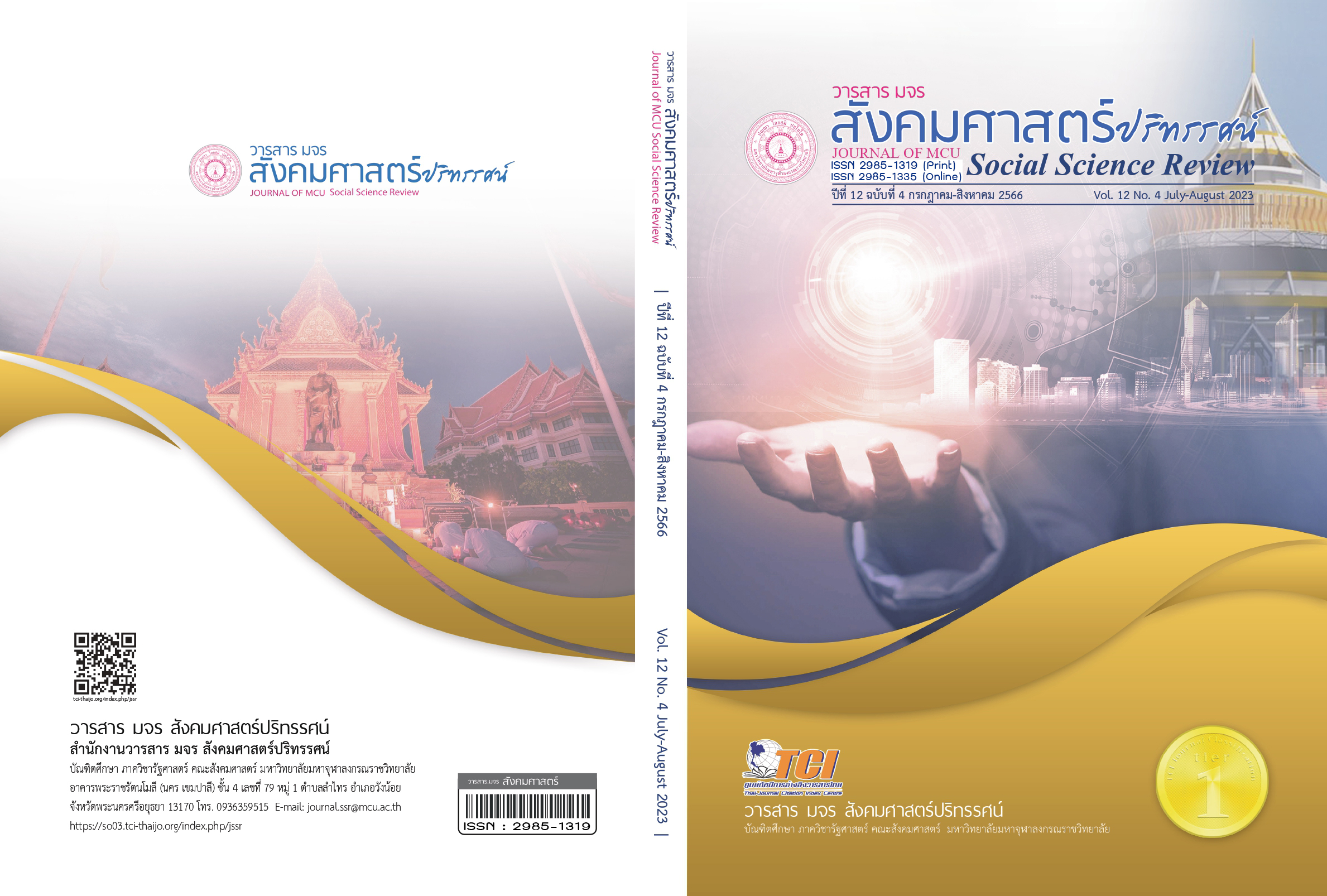รูปแบบการพัฒนาความเป็นพลเมืองในระบอบประชาธิปไตยตามแนวทางพระพุทธศาสนาของประชาชนในจังหวัดนนทบุรี
คำสำคัญ:
ความเป็นพลเมือง, ประชาธิปไตย, พระพุทธศาสนา, นนทบุรีบทคัดย่อ
บทความวิจัยนี้มีวัตถุประสงค์เพื่อศึกษาลักษณะความเป็นพลเมือง องค์ประกอบการพัฒนาความเป็นพลเมือง และรูปแบบการพัฒนาความเป็นพลเมืองในระบอบประชาธิปไตยตามแนวพระพุทธศาสนาของประชาชนในจังหวัดนนทบุรี เป็นการวิจัยเชิงคุณภาพ ผู้ให้ข้อมูลสำคัญ จำนวน 25 รูปหรือคน ผลการวิจัยพบว่า 1. ลักษณะความเป็นพลเมืองในระบอบประชาธิปไตยของประชาชนในจังหวัดนนทบุรี ประกอบด้วย 1) ด้านรับผิดชอบต่อตนเองและสังคม 2) ด้านเคารพหลักความเสมอภาคและสิทธิผู้อื่น 3) ด้านเคารพความแตกต่าง และ 4) ด้านเคารพกติกา 2. องค์ประกอบการพัฒนาความเป็นพลเมืองในระบอบประชาธิปไตยของประชาชนในจังหวัดนนทบุรี ประกอบด้วย 1) ด้านอำนาจโดยความรู้ 2) ด้านอำนาจในการปฏิบัติ และ 3) ด้านอำนาจของความคิดและทัศนคติ 3. รูปแบบการพัฒนาความเป็นพลเมืองในระบอบประชาธิปไตยตามแนวพระพุทธศาสนาของประชาชนในจังหวัดนนทบุรี ตามหลักสัปปุริสธรรม 7 ประกอบด้วย 1) ด้านธัมมัญญู (ผู้รู้จักเหตุ) 2) ด้านอัตถัญญู (ผู้รู้จักผล) 3) ด้านอัตตัญญู (ผู้รู้จักตน) 4) ด้านมัตตัญญู (ผู้รู้จักประมาณ) 5) ด้านกาลัญญู (ผู้รู้จักกาลเวลา) 6) ด้านปริสัญญู (ผู้รู้จักชุมชน) และ 7) ปุคคลัญญู (ผู้รู้จักบุคคล)
เอกสารอ้างอิง
กรณัฐ ระงับทุกข์. (2564). การพัฒนาความเป็นพลเมืองในระบอบประชาธิปไตยของประชาชนที่มีผลต่อการเลือกตั้งทั่วไปในกรุงเทพมหานคร (ปริญญาดุษฎีบัณฑิต สาขาวิชารัฐศาสตร์). พระนครศรีอยุธยา: มหาวิทยาลัยมหาจุฬาลงกรณราชวิทยาลัย.
ณัฏฐพล บุณยพิพัฒน์. (2562). ปัญหาและอุปสรรคในการพัฒนาระบอบประชาธิปไตยของไทย (พ.ศ. 2475–ปัจจุบัน) : ข้อสังเกตในเชิงทฤษฎี เอกสารการประชุมวิชาการระดับชาติ ด้านการบริหารกิจการสาธารณะยุคติจิทัล ครั้งที่ 5 (การบริหารกิจการสาธารณะยุคดิจิทัล : กฎหมาย ความเป็นธรรม และการกลับคืนสู่ประชาธิปไตย). ขอนแก่น: วิทยาลัยการปกครองท้องถิ่น มหาวิทยาลัยขอนแก่น.
ถวิลวดี บุรีกุล และคณะ. (2563). การศึกษาพฤติกรรมความเป็นพลเมืองสำหรับสังคมไทย (รายงานวิจัย). นนทบุรี: สถาบันพระปกเกล้า.
ธนาชัย สุนทรอนันตชัย และคณะ. (2562). หน้าที่ของพลเมืองกับการเสริมสร้างสิทธิเสรีภาพสู่ความเป็นพลเมืองตามรัฐธรรมนูญแห่งราชอาณาจักรไทย พุทธศักราช 2560 (รายงานการวิจัย). นนทบุรี: สถาบันพระปกเกล้า.
ปรมต วรรณบวร. (2559). ความเป็นพลเมืองเพื่อการส่งเสริมประชาธิปไตยในท้องถิ่น (ปริญญาพุทธศาสตรดุษฎีบัณฑิต สาขาวิชารัฐประศาสนศาสตร์). พระนครศรีอยุธยา: มหาวิทยาลัยมหาจุฬาลงกรณราชวิทยาลัย.
พระธรรมปิฎก (ป.อ.ปยุตฺโต). (2543). กระบวนการเรียนรู้เพื่อพัฒนาคนไปสู่ประชาธิปไตย. กรุงเทพฯ: โรงพิมพ์มหาจุฬาลงกรณ์ราชวิทยาลัย.
สมเด็จพระอริยวงศาคตญาณ สมเด็จพระสังฆราช (จวน อุฏฐายี). (2509). สัปปุริสธรรมหนังสือ อนุสรณ์เนื่องในโอกาสงานฌาปนกิจศพ นายชัย. กรุงเทพฯ: ม .ป .ท.
สัมพันธ์ รอดพึ่งครุฑ และคณะ. (2564). จิตสำนึกความเป็นพลเมืองในระบอบประชาธิปไตย. วารสารวิชาการ มนุษยศาสตร์และสังคมศาสตร์ มหาวิทยาลัยราชภัฏอุตรดิตถ์, 8(2), 153-165.
สำนักงานเลขาธิการสภาผู้แทนราษฎร. (2555). พลเมืองในระบอบประชาธิปไตย. กรุงเทพฯ: สำนักงาน เลขาธิการสภาผู้แทนราษฎร.
_______. (2559). การเสริมสร้างความเป็นพลเมืองในระบอบประชาธิปไตย. กรุงเทพฯ: สำนักงานเลขาธิการสภาผู้แทนราษฎร.
ดาวน์โหลด
เผยแพร่แล้ว
รูปแบบการอ้างอิง
ฉบับ
ประเภทบทความ
สัญญาอนุญาต
ลิขสิทธิ์ (c) 2023 วารสาร มจร สังคมศาสตร์ปริทรรศน์

อนุญาตภายใต้เงื่อนไข Creative Commons Attribution-NonCommercial-NoDerivatives 4.0 International License.
เพื่อให้เป็นไปตามกฎหมายลิขสิทธิ์ ผู้นิพนธ์ทุกท่านต้องลงลายมือชื่อในแบบฟอร์มใบมอบลิขสิทธิ์บทความให้แก่วารสารฯ พร้อมกับบทความต้นฉบับที่ได้แก้ไขครั้งสุดท้าย นอกจากนี้ ผู้นิพนธ์ทุกท่านต้องยืนยันว่าบทความต้นฉบับที่ส่งมาตีพิมพ์นั้น ได้ส่งมาตีพิมพ์เฉพาะในวารสาร มจร สังคมศาสตร์ปริทรรศน์ เพียงแห่งเดียวเท่านั้น หากมีการใช้ภาพหรือตารางหรือเนื้อหาอื่นๆ ของผู้นิพนธ์อื่นที่ปรากฏในสิ่งตีพิมพ์อื่นมาแล้ว ผู้นิพนธ์ต้องขออนุญาตเจ้าของลิขสิทธิ์ก่อน พร้อมทั้งแสดงหนังสือที่ได้รับการยินยอมต่อบรรณาธิการ ก่อนที่บทความจะได้รับการตีพิมพ์ หากไม่เป็นไปตามข้อกำหนดเบื้องต้น ทางวารสารจะถอดบทความของท่านออกโดยไม่มีข้อยกเว้นใดๆ ทั้งสิ้น





